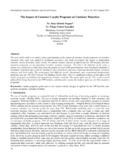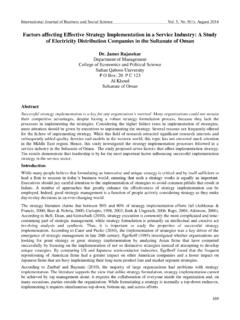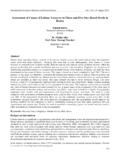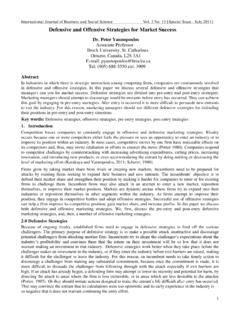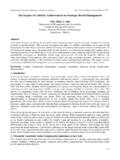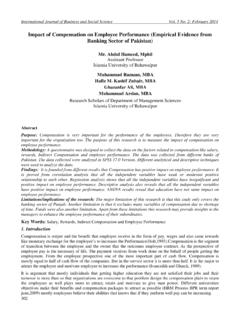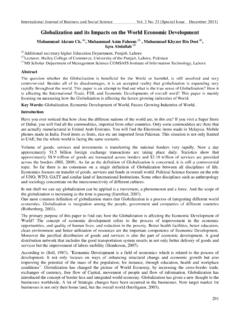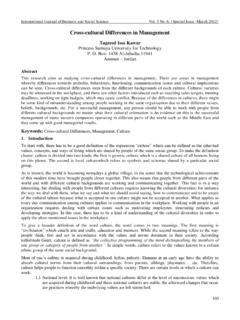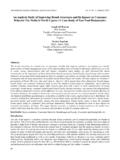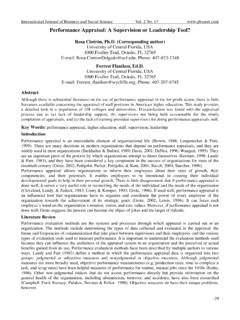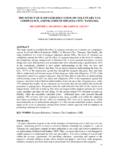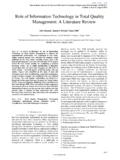Transcription of Risk Analysis of Letter of Credit ------Based on ...
1 International Journal of Business and Social Science Vol. 4 No. 9; august 2013 . Risk Analysis of Letter of Credit ------Based on Principles of Independence' and Strict Compliance'. Yan Hao Lecturer in Economics School of Economics and Management, Sichuan University of Science & Engineering Sichuan Province, China Ling Xiao Lecturer in Law Law School, Sichuan University of Science & Engineering Sichuan Province, China Abstract Based on the UCP 500 and UCP 600, this paper analyses the two principles of Letter of Credit , in order to prepare the theory basis for the risks Analysis afterwards. For the different parties (exporter, importer, banks), possible risks and frauds are shown with case studies.
2 The paper also puts forward the advice for various risks and intends to indicate that risks still exit in Letter -of- Credit transaction even it is the safest method of payment nowadays in international trade. Those risks may happen on each party, which is not only the exporter, but also the importer and banks. Rights for each party always come with the appropriate obligations. Keywords: Letter of Credit , principle of independence, principle of strict compliance 1. Introduction As the payment instrument, Letter of Credit has become widely used in international trade. Letter of Credit is even described as the life-blood of international commerce '1.
3 Letter of Credit takes care of the interests of both the exporter and importer, so it is considered to be the most effective and safest method to secure the payment in an international trade transaction. The legal basis of Letter of Credit is UCP 5002, which is published by ICC3. As the international convention for the Letter -of- Credit transaction, UCP 500 holds the most important doctrines for the using of Letter of Credit --- the two principles --- principle of independence and strict compliance. 4 In the real practice, these two principles are the amulet that can secure the payment for both exporter and importer, but also the main source that can cause the risks for a Letter -of- Credit transaction.
4 2. Two Essential principles about Letter of Credit From the technical review, there are two essential principles when people use Letter of Credit as the transaction way. The first one is the principle of independence, which is clearly indicated in Art. 3 of UCP 500; another principle is strict compliance, which is described in of UCP 1. R D Harbottle (Mercantile ) Ltd V National Westminster Bank Ltd [1977] 2 All ER 862 at 870 b. 2. UCP stands for Uniform Customs and Practice for Documentary Credits. UCP were originally formulated in 1933 by the International Chamber of Commerce, the most recent revision came into effect in 1994 (ICC publication 500).
5 See Hugo CF The Development of Documentary Letters of Credit as Reflected in the Uniform Customs and Practice of Documentary Credits' (op cit) 52. See Hugo CF' The Development of Documentary Letter of Credit as Reflected in the Uniform Customs and Practice of Documentary Credits' (op cit) page 53. 3. ICC stands for International Chamber of Commerce. 4. Ramberg (International Commercial Transactions) pages 142;144. 5. Ramberg. Jan, international commercial transactions, Stockholm 2000, page 142;144. 199. Center for Promoting Ideas, USA Principle of independence credits, by their nature, are separate transactions from the sales or other contract(s) on which they may be based and banks are in no way concerned with or bound by such contract.
6 6 The principle of independence comes from a The detail significations of independence a. Obligation of payment vs performance of sales contract The payment obligation of issuing bank to beneficiary (exporter) is separated from the performance of beneficiary based on the sales As long as beneficiary presents the compliant bill of documents, issuing bank should accept even though beneficiary disobeyed the sales contract that made with the applicant (importer). b. Obligation of payment vs obligation of issuing bank The payment obligation of issuing bank is also independent of the underlying the contract between applicant and bank.
7 9 For example, applicant goes bankruptcy after the bank issues Letter of Credit . Although applicant cannot pay the money, issuing bank still cannot reject the payment obligation. Issuing bank has to pay when beneficiary presents the bill of documents in strict compliance. The rule, that Letter of Credit is independent out of the sales contract between the importer and exporter, is based on two reasons. Firstly, legislation, convention and judicatory case confirm the regulation that issuing bank is not responsible for the performance of sales Because issuing bank is not the party of sales contract11. Issuing bank cannot control the contract content, or choose who should be the beneficiary of Credit .
8 Secondly, besides knowing the clauses of Letter of Credit and bill of documents, if the issuing bank try to evaluate the performance situation and the dispute between the contract parties, it is not the tenet of Letter of Credit , which means Letter of Credit will lose its sales value as the safest instrument of international settlement12. Problems disputed in the real practice With reference to the principle of independence, there are two problems disputed frequently in the real practice. a. The restriction of sales contract for the Letter of Credit From the side of bank, Letter of Credit becomes effective after it is issued, and it should be considered as the irrevocable Letter of credit13.
9 Bank will perform its obligation based on the original Credit before it receives the amendment notice from the sales parties. According to the principle of independence, banks are only restricted by the Letter of Credit instead of sales contract. From the parties of sales contract, commercial parties are not only restricted by the Letter of Credit , but also restricted by the sales contract. Since payment clause is the basic clause of the sales contract, it is the obligation of importer to issue a Letter of Credit complying with the sales contract, and also the precondition of exporter to deliver the goods and present the documents.
10 For the sales parties, the precondition for Letter of Credit is the compliance between Credit and contract. Therefore, the principle of independence is only for the relationship between banks and sales parties (importer and exporter), which is not applied on the relationship between sales parties. 14. 6. Art. 3, UCP 500: a. Credit , by their nature, are separate transactions from the sales or other contract(s) on which they may be based and banks are in no way concerned with or bound by such contract(s), even if any reference whatsoever to such contract(s) is included in the Credit . Consequently, the undertaking of a bank to pay, accept and pay draft(s) or negotiate and/or to fulfill any other obligation under the Credit , is not subject to claims or defenses by the applicant resulting from his relationships with the issuing bank or the beneficiary.
